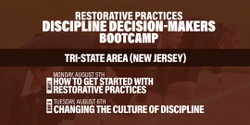Restorative Practices: Discipline Decision-Makers' Bootcamp (Tri-State Area)
Event description
REGISTER WITH A PURCHASE ORDER
To register with a purchase order, Click Here.
REGISTER WITH CREDIT CARD (TAX-EXEMPT)
Humanitix collects sales tax in New Jersey for all credit card sales. We are aware that most of our registrants are tax-exempt and can provide the necessary documentation.
If your organization is tax-exempt and would like to pay for your registration by credit card, Click Here.
COST OF REGISTRATION
- FULL REGISTRATION - EARLY BIRD Individual - $375 per person*
- FULL REGISTRATION - GROUP RATE (2+) - $375 per person
- FULL REGISTRATION - Individual - $450 per person
- 1-DAY REGISTRATION - EARLY BIRD Individual - $195 per person*
- 1-DAY REGISTRATION - GROUP RATE (2+) - $195 per person
- 1-DAY REGISTRATION - Individual - $225 per person
* Early Bird Registration Ends Friday, June 28th at 11:59 pm EDT.
PARTICIPANT PERKS
All participants will receive a Certificate of Completion for each day attended and complimentary access to:
- Access to Discipline Decision Makers Bootcamp Online Resources
- One-Day Participants - One Course on LTV Academy*
- Both Day Participants - One Live Q&A Session*
*Participants must fulfill their registration payment before receiving access to the complimentary resources.
WHO SHOULD ATTEND
Principals, assistant principals, deans, restorative practices coordinators, counselors, social workers, behavior interventionists, in-school suspension teachers, teacher leaders, or anyone on the campus who supports behavior are ideal participants for this boot camp.
NEED A HOTEL ROOM?
If you need to book a hotel room, please click here
WORKSHOP OVERVIEW
Unlock the transformative potential of restorative practices with our two-day Discipline Decision-Makers Bootcamp, tailored exclusively for educators charged with supporting behavior on their campus. This intensive workshop will equip you with the practical tools and strategies to help you seamlessly integrate restorative practices into your school's behavior management framework. During the boot camp, participants will delve into the core principles of restorative practices, learning to foster a culture of accountability, empathy, and community within your campus. This interactive two-day session will focus on real-world applications, empowering you with practical insights into strategically using restorative practices to build community and repair relationships.
The boot camp will provide a comprehensive understanding of the three key approaches to problem-solving: prevention, intervention, and suppression. These strategies are essential tools for educators in managing and addressing behavioral issues effectively.
PREVENTION: Prevention is the best option because the best way to address a problem is to prevent it. The two primary ways to prevent problems on a campus are emphasizing building relationships amongst all stakeholders and teaching appropriate behavior, especially when the student has yet to learn it. Discipline decision-makers must understand that you can't prevent all issues and that prevention focuses on minimizing problems. During the training, we will guide participants through best practices and strategies to effectively support teachers and staff to minimize and prevent disruptive behavior from escalating.
INTERVENTION: The goal of intervention is to solve the problem. Restorative Practices, which are alternatives to suspension and PBIS interventions, are strategies implemented to solve the problem. If the aim is to solve the problem or at least control it, discipline decision-makers need to prioritize intervention. During the training, we will guide participants on appropriately addressing challenging behavior problems by providing specific alternatives to suspension designed to change behavior but still hold students accountable.
SUPPRESSION: Suppression aims to temporarily eliminate the problem. Strategies such as detention and in-school and out-of-school suspension are all forms of suppression intended to do this. Discipline decision-makers sometimes need temporary, immediate solutions to address disruptive student behavior. During the training, we will guide you to help you determine when suppressing the problem is appropriate and the best approach to take when necessary.
Discipline decision-makers recognize their pivotal role in cultivating an optimal, safe, and supportive learning environment. The boot camp will empower participants to unlock the transformative power of restorative practices, enabling their campus to evolve into a thriving community where every stakeholder feels valued and integral to the collective goal of student achievement.
Day #1 - How To Get Started With Restorative Practices
Sometimes, discipline decision-makers suffer from paralysis by analysis regarding restorative practices. These practices can be very intimidating and overwhelming to someone with no or limited experience with this approach.
Our training is designed to guide you through a step-by-step process, providing a clear road map to implement restorative practices effectively in your schools.
- IDENTIFY: First, we'll determine your two main problem areas regarding student behavior and develop specific strategies to address those challenges. The training will provide best practices for identifying your primary problems and specific alternatives to suspension strategies that can be used to address these issues effectively.
- STRATEGIZE: After you identify the two main problem areas and develop strategies to address them, you must figure out how to implement them. We'll focus on figuring out who will and can support, what student(s) and grade level to start with, and all other logistics. The training will provide best practices for developing strategies to address them.
- IMPLEMENT: It's crucial to start small when getting started. This approach allows you to familiarize yourself with the implementation process and adjust as needed. Our training will equip you with best practices for this initial step, ensuring a smooth transition to restorative practices on your campus.
- SCALE: Once you understand how to implement the strategies effectively, you will need a plan to expand your reach to more students. The training will provide best practices for scaling your initiative on your campus.
Day #2 - Changing The Culture of Discipline
Implementing restorative practices in a school is not just a procedural change; it's a cultural shift that requires the collective commitment of all stakeholders involved. This shift, however, brings numerous benefits to the school community. When stakeholders understand the principles behind restorative practices and actively participate, they become invested in creating a supportive and inclusive school environment. Their engagement fosters trust, strengthens relationships, and promotes accountability, ultimately reducing conflicts and improving overall well-being within the school community. By embracing restorative practices, stakeholders demonstrate their dedication to nurturing a positive school where everyone feels valued and respected, leading to a more harmonious and productive learning environment.
- IDENTIFYING KEY STAKEHOLDERS: Identifying your key stakeholders is important because they will make or break your initiative. The training will provide best practices for identifying the essential parents, students, campus staff, district personnel, and community members who will most impact your initiative.
- ENGAGING STAKEHOLDERS: Your initiative's success hinges on the active participation of all stakeholder groups. The training will equip you with best practices for effectively communicating information about your initiative with your stakeholders, making them feel valued and integral to the process.
- ASSESSING SUCCESS: To determine the effectiveness of your initiative, you will need to set objective measures. The training will provide best practices for gauging its success.
- EMBRACING STAKEHOLDERS: Effectively embracing your stakeholders directly results in buy-in. The training will provide best practices for creating a collaborative environment for your initiative.
ABOUT THE PRESENTER
KELVIN OLIVER is an Educational Consultant specializing in implementing Restorative Practices in Schools. As a campus administrator he played an instrumental role in the development, implementation, and support of Restorative Practices. Kelvin is credited for creating a Restorative Practices campus-based support model that included weekly professional development and an implementation support team. Since 2007, he has worked in education as a special education teacher, classroom teacher, campus math specialist, district curriculum specialist, assistant principal, campus principal and consultant.
For more information about Kelvin’s work, please visit www.leavingthevillage.com.
FAQs
What's the cancellation/refund policy for this workshop?
If you cannot attend and would like to request a refund, please submit your refund request in writing SEVEN (7) DAYS before the scheduled date of the workshop. Submit all refund requests to billing@leavingthevillage.com. If you submit your refund request within SEVEN (7) DAYS of the workshop, you can be given a credit that can be applied to any of our future workshops.
Will meals be provided either or both days of the workshop?
We've allotted one hour and 15 minutes for workshop attendees to have lunch on their own. Because most attendees work on a campus with students, they are rarely afforded the opportunity to go to a restaurant for lunch. Our hope is that each attendee takes advantage of this unique opportunity to enjoy a sit-down lunch like most other working professionals are able to do. Throughout both days, beverages such as coffee, water, and hot tea will be available to all participants.
Is this workshop beneficial for elementary educators?
Our workshops are differentiated to meet the needs of all levels, K-12. With that said, Kelvin Oliver, the presenter, was a PK-6 campus administrator when he implemented Restorative Practices on a campus. His time as a campus administrator is where he developed many of the concepts that are presented during these workshops. While the focus will be on all grade levels, elementary educators will not walk away from this workshop feeling that it didn't apply to them.
When should I expect to receive the supporting resources?
Participants who fulfill payment for their registration before the start of their scheduled workshop can expect their complimentary resources within two weeks after the conclusion of the workshop they attended. Participants who register using a purchase order as a promise of payment must fulfill the purchase order payment before receiving their complimentary resources. Once the purchase order payment is fulfilled, participants can expect to receive their complimentary resources within two weeks of receipt of payment.
Should I attend if I've already attended a workshop?
The Discipline Decision-Makers' Bootcamp is our new professional learning opportunity for those currently implementing or looking to begin implementing Restorative Practices. This workshop will continue the learning for previous participants looking to take the next step while simultaneously bringing new participants up to speed. New strategies will be shared, but the primary focus of this two-day workshop will be on how to completely shift the behavior management philosophy and systems for your campus or district to become organically more restorative.
The workshop will provide step-by-step guidance on:
- identifying which students to use the strategies with
- selecting the appropriate strategies
- the appropriate time to use strategies
- and how to implement strategies effectively
- securing the buy-in of key stakeholder groups
Some strategies shared in previous workshops will be shared again as an introduction to first-time participants and a refresher for past participants. If you previously attended and are coming with someone who is attending for the first time, you should both be able to go back to your campus or district with an aligned understanding ready to implement.
Almost all of the strategies and concepts presented in the three virtual workshop sessions in both series will be presented again during the in-person workshops. With that said, the in-person workshops provide a greater opportunity to give more context because all of the strategies are presented in a day versus over the course of three 90-minute sessions. The in-person workshops also provide an opportunity for hands-on learning activities that can't be duplicated virtually. The in-person workshop would be beneficial for those who have attended our virtual workshops but would like a refresher with some hands-on learning opportunities.
Will I be able to earn CEUs if I attend this workshop?
Unfortunately, we can't guarantee that you will be able to receive continuing education units if you attend our workshops. We offer our workshops around the country and we are in the process of ensuring our attendees can earn credits in the future.
Tickets for good, not greed Humanitix dedicates 100% of profits from booking fees to charity


